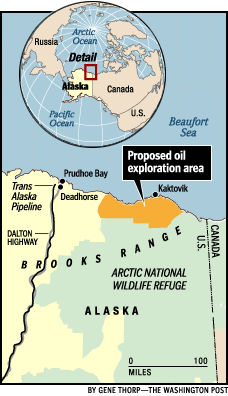A closely divided Senate yesterday voted in favor of opening Alaska's
Arctic National Wildlife Refuge to oil drilling, bringing a long-sought goal of
the Bush administration within striking distance of being realized.
The action marks the first time the Senate has signaled its support for
drilling in the ecologically sensitive area since President Bush took office.
And while hurdles remain, drilling advocates said they are close to achieving
their decades-long drive to tap billions of barrels of oil beneath the 1.5
million-acre coastal plain.
By 51 to 49, the Senate thwarted an attempt by most Democrats and some
moderate Republicans to strip a provision on drilling in the refuge from the
2006 congressional budget resolution. By giving the drilling proposal the
protection of the budget rules, GOP leaders have effectively prevented opponents
from using a filibuster to block a final vote on the proposal.
Congress used a similar approach in approving the drilling as part of a
budget bill in 1995 over the strong objection of environmentalists, but
President Bill Clinton later vetoed the measure. This time, however, supporters
are bolstered by a Republican president who has made the drilling a key piece of
his energy policy, a GOP-controlled House that has repeatedly favored drilling,
and a Senate whose Republican majority grew by four seats in last November's
election.
Sen. John F. Kerry (D-Mass.), a leader in the fight to stop the
drilling, said there will be "a lot more opportunities to make an effort to
strike it." But he acknowledged that "the Republicans have the votes in the
House and they have the votes in conference."
The Senate and House still must agree on a final version of next year's
budget, and there are signs the two chambers strongly disagree on the size of
proposed Medicaid cuts and other key spending issues.
Drilling proponents said tapping the refuge would lessen dependence on
foreign oil, help bring down energy prices, provide jobs and ease the country's
growing trade imbalance. They also argued that modern technology would limit the
area needed to drill in the arctic. But opponents disagreed, saying that
drilling would do little to reduce dependence on foreign oil and that there
would be virtually no impact on prices, which are set as a result of activity on
the world market. Using posters showing panoramic views of pristine wilderness,
opponents also said that pipelines and drilling platforms would harm calving
caribou, polar bears and millions of migratory birds in the Alaskan
refuge.
Sen. Pete V. Domenici (R-N.M.), chairman of the Energy and Natural
Resources Committee, said the prospects for opening the refuge are much stronger
than in previous years. "The chances of this happening are excellent," he said.
"There is a legislative path to getting this done. The path is passing a budget
resolution that has [the provision] in both houses."
The key Senate vote was on an amendment championed by Sen. Maria
Cantwell (D-Wash.) to drop the drilling approval from the budget resolution.
Three Democrats -- Daniel K. Inouye and Daniel K. Akaka of Hawaii and Mary
Landrieu (La.) -- joined 48 Republicans to defeat the amendment. Seven
Republicans, 41 Democrats and one independent voted to eliminate the drilling
provision.
Opponents had hoped to win over a few fence-straddling lawmakers at the
last minute, but they failed. One of them, freshman Sen. Mel Martinez (R-Fla.),
said he voted for drilling only after receiving assurances from the White House
that no drilling would occur on Florida's Gulf Coast through at least
2012.
Oil prices reached record highs yesterday as global demand pushed
production to its limits. During a news conference before the vote, Bush
expressed concern about rising energy prices and again pressed for the opening
of the refuge as part of a package of energy legislation the administration has
been pushing.
"This project will keep our economy growing by creating jobs and
ensuring that businesses can expand," Bush said in a statement after the
vote.
If Congress approves the Alaskan drilling, oil industry officials said
it probably would take seven to 10 more years before oil begins flowing from the
ground. Oil production already occurs near the refuge on Alaska's North
Slope.
Government models forecast that oil companies would be able to pump
nearly 1 million barrels of crude oil a day from the refuge in 2025. With oil
from the refuge, the United States would import about 65 percent of its oil in
2025, compared with about 68 percent without the additional domestic oil,
according to data from the Energy Department's Energy Information
Administration.
In some previous years, drilling in the refuge was defeated because
proponents could not muster the 60 votes needed to cut off a filibuster. Under
Senate rules, the budget resolution cannot be filibustered and a 51-vote
majority is needed to approve it.
Once both chambers approve budget resolutions, they will go to a
conference committee, where GOP leaders will attempt to iron out differences.
Then the resolution returns to the House and Senate for final approval.
If the drilling provision remains in the budget, the Energy and Natural
Resources Committee in the Senate and the House Resources Committee will have to
approve measures laying out details for drilling in the refuge. Those measures
would need majority support and would not be subject to filibuster.
On other fronts of the budget battle yesterday, the Senate rejected an
effort to reinstate budget rules mandating that any tax cuts be offset by
equivalent spending reductions or revenue increases. The "pay-as-you-go" rules,
in effect through the 1990s, could have jeopardized Bush's call to make his
first-term tax cuts permanent, but it would have also complicated efforts to
secure approval of a budget resolution.
Staff writer Jonathan Weisman contributed to this
report.

